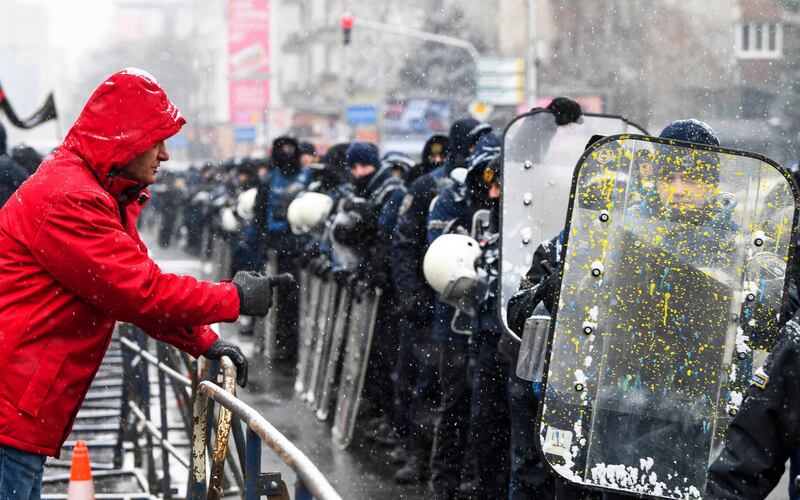Macedonian lawmakers are in the final stretch of renaming their country North Macedonia as part of a deal with neighbouring Greece in return for membership of NATO and potentially the European Union.
Speaking at the start of a debate on essential constitutional amendments that are part of the deal, prime minister Zoran Zaev told lawmakers that by signing the agreement, the country is finally ending a decades-long dispute with a deal that recognises Macedonian national identity and language.
“This is a historic and patriotic choice. We can be the generation that has made a bold decision,” Mr Zaev said.
_______________
Read more:
Macedonia Parliament gives approval for name change
_______________
The parliamentary session was adjourned until Thursday after Mr Zaev’s speech. The debate is expected to last until Friday.
The deal, signed in June, aims to put an end to a dispute with Greece that has kept the former Yugoslav republic out of organisations such as NATO and the EU. Greece argues use of the term ‘Macedonia’ implies territorial claims on its own northern province of the same name, and on its ancient Greek heritage.
The agreement has met with opposition in both countries, with opponents arguing it makes too many concessions to the other side.
The centre-right VMRO-DPMNE opposition party boycotted Wednesday’s parliamentary session, with party leader Hristijan Mickoski and other party lawmakers joining several hundred protesters outside parliament who were calling the name change deal “national treason.”
Despite the objections in Macedonia, the constitutional changes are expected to pass. Aleksandar Kiracovski, secretary general of the Social Democrats who heads the governing coalition, indicated the government has secured the votes from the required two-thirds, or 80, lawmakers in the 120-seat parliament.
“I have information that over 80 lawmakers have assured that Macedonia’s future is in NATO and the European Union, and this is conditioned by the ‘Prespa’ agreement and the constitutional changes,” Mr Kiracovski said, referring to Late Prespa on the border of Greece, Macedonia and Albania where the deal was signed.
Opposition head Mr Mickoski accused the Social Democrats of securing the majority through blackmail, although he did not elaborate on the claim.
“The lawmakers will vote because of blackmail, not by their free will. Are these European values?” Mr Mickoski told reporters before the parliamentary session. “‘North Macedonia’ is perhaps Zaev’s homeland, but mine is the Republic of Macedonia.”
The amendments being debated envisage changing the preamble and four articles of the constitution to rename the country North Macedonia with guarantees it has no territorial aspirations towards its neighbours and is committed to good neighbourly relations.
Parliament is also expected to add an amendment to the law that puts the new constitution in force, stating the constitutional changes will not be valid until Greece’s parliament ratifies its side of the name deal and signs the accession protocol making the country a NATO member.






